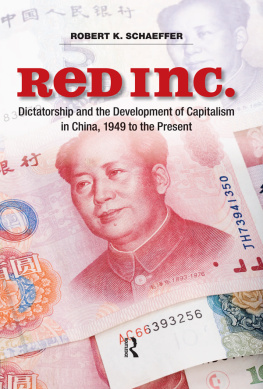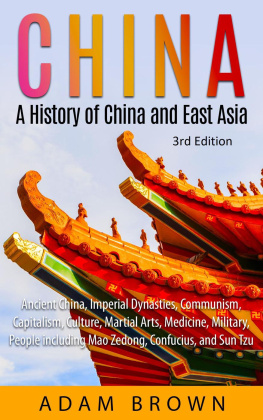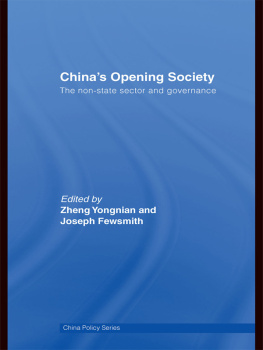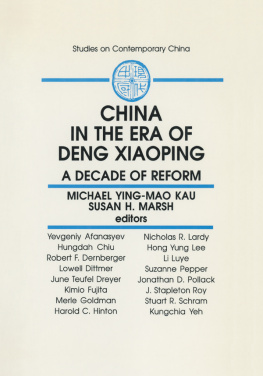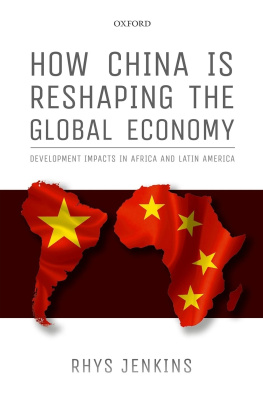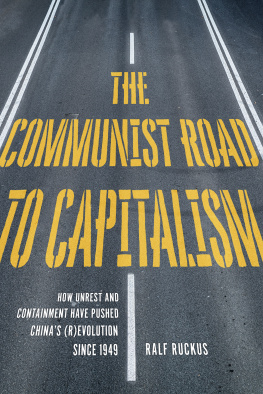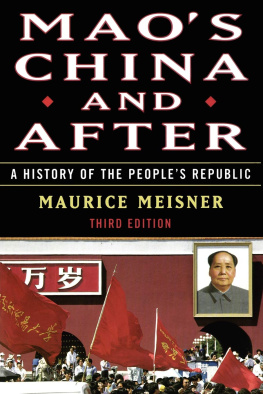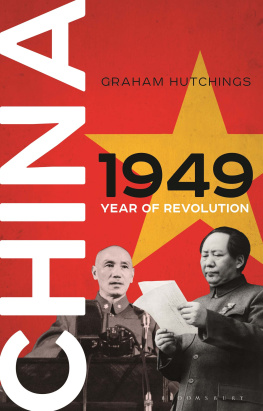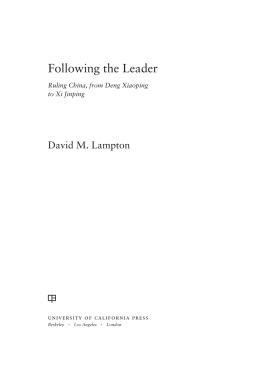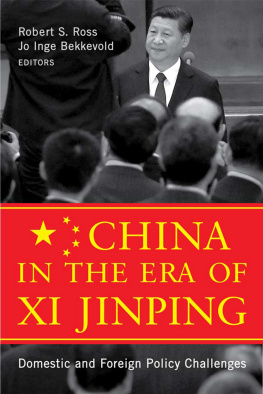Red Inc.
First published 2011 by Paradigm Publishers
Published 2016 by Routledge
2 Park Square, Milton Park, Abingdon, Oxon OX14 4RN
711 Third Avenue, New York, NY 10017, USA
Routledge is an imprint of the Taylor & Francis Group, an informa business
Copyright 2011, Taylor & Francis.
All rights reserved. No part of this book may be reprinted or reproduced or utilised in any form or by any electronic, mechanical, or other means, now known or hereafter invented, including photocopying and recording, or in any information storage or retrieval system, without permission in writing from the publishers.
Notice:
Product or corporate names may be trademarks or registered trademarks, and are used only for identification and explanation without intent to infringe.
Library of Congress Cataloging-in-Publication Data
Schaeffer, Robert K.
Red inc. : dictatorship and the development of capitalism in China, 1949 to the present /
Robert K. Schaeffer.
p. cm.
Includes bibliographical references and index.
ISBN 978-1-59451-711-2 (hardcover : alk. paper)
1. ChinaEconomic policy2000. 2. CapitalismPolitical aspectsChina.
3. DictatorshipChina. I. Title.
HC427.95.S33 2011
330.951dc22
2011008494
Designed and Typeset by Straight Creek Bookmakers.
ISBN 13: 978-1-59451-711-2 (hbk)
ISBN 13: 978-1-59451-712-9 (pbk)
Some books present fresh evidence; others make arguments that urge the reader to see old problems in a new light. This work is decidedly of the latter sort.
Theda Skocpol, States and Social Revolutions
This book takes as its subject the development of capitalism in China. Like Skocpols, it urges the reader to see old problems in a new light. The central problem is how to understand economic and political developments in China since 1949. I take 1949 as a starting point because developments in the 1950s and 1960s shaped policies and practices in subsequent years. Thus, contemporary events can be understood only by taking a close look at China in the early years.
Many scholars have argued that Chinese history since the revolution should be divided into two parts: a Maoist period (19491978), when the Chinese Communist Party promoted socialism, and a reformist period (1978 to the present) when Deng and his successors promoted capitalism. This approach emphasizes the economic dis continuity between the two periods regardless that the reforms adopted by Chinese leaders in the 1980s were first introduced by Mao in the 1950s and that the Communist Party held political power throughout the entire postrevolutionary period. In my view, this approach creates several problems.
First, it requires the reader to assume that the regime under Mao practiced socialism. This is difficult to sustain. As Maurice Meisner has argued, There was little that was socialist in Chinese Communist policies during the early years of the Peoples Republic. The accomplishments of the mid-1950s essentially amounted to a capitalist or bourgeois revolution, albeit with only marginal participation of what remained of the bourgeoisie.the term in an extremely cynical and impoverished way. From the outset, the regime worked furiously to accumulate the capital it needed to finance rapid industrialization and provide wealth for the new ruling class. This ongoing project promoted the development of capitalism, not socialism, in China.
Second, this approach means that because the regime remained in power during both periods, it must have changed in some fundamental way from a party led by socialist revolutionaries to a party led by capitalist roaders. This requires the reader to assume, as many scholars do, that the class character of the regime changed dramatically from one period to the next. However, this argument is difficult to sustain empirically because the ruling class that came to power in 1949 remains in power today, and central political figures like Deng Xiaoping provided leadership during both periods.
Third, this approach urges readers to adopt what is essentially a Maoist interpretation of events. This is extremely problematic given the fact that Mao adopted disastrous economic and political policies, repeatedly changed his positions, and always provided a self-serving justification for his actions and retractions. In my view, the lingering nostalgia for Mao, which finds expression in the emphasis on the dis continuities between Mao and his successors, undermines serious scholarship and should be abandoned.
Conversely, this book sees the problem of periodization in a different way. First, it sees continuity where others see dis continuity. In my view, the regime in both periods promoted capitalist development, a goal that the regime shared in common with many other developmentalist dictatorships during the postwar period. Around the world, dictatorships in both capitalist and communist spheres promoted capitalist development as a way to industrialize their economies, modernize their societies, and catch up with urban, industrialized countries in the West. Second, the regime in China did not fundamentally change as a class after Mao died; instead, it advanced its long-term and ongoing interests as a ruling class and provided economic and political rewards to both Maoists and reformers.
Of course, although this book insists on economic and political continuity, it recognizes important economic and political differences between the two periods. The main economic difference was that although Mao and Deng both promoted capitalist development, Mao failed to achieve any real economic growth during the first period, whereas Deng and his successors succeeded in promoting economic growth during the second period. Mao failed, in part, because he tried to promote development with little external aid. By contrast, Deng successfully mobilized foreign investors to assist the development of capitalism in China. In political terms, Mao initiated faction fighting that divided the ruling class in the first period. In the later period, Deng and his successors united the fractious ruling class and enhanced its power. In my view, the important conflicts within the regime were not struggles between different classesa characterization that depends, again, on a Maoist interpretation of eventsbut rather between factions of the same class. This may seem a trivial distinction, but as we will see, it is a critical difference that has significant consequences.
In general, this books emphasis on continuity has two important consequences. First, it means that the early, Maoist period must be analyzed to appreciate developments in subsequent years. Second, taking a long view of events means that all of the major developments in China since 1949 need to be reassessed: land reform and collectivization, the Great Leap Forward and famine, the Cultural Revolution, economic reforms, Tiananmen Square, and the rapid economic growth that occurred after 1989.
* * *
This book relies on the work of scholars and journalists who study China. Scholars such as Carl Riskin, Mark Selden, Elizabeth J. Perry, Dorothy Solinger, and Maurice Meisner provided the factual bedrock for the arguments made here. Journalists such as Keith Bradsher, David Barbosa, Sheryl WuDunn, Nicholas D. Kristof, Andrew Jacobs, and Edward Wong made careful observations of contemporary conditions in China. Although China scholars and I agreed on the facts, we often drew different conclusions from them, which is a normal occurrence in a field in which people with different political perspectives sharply contest the interpretation of events.

